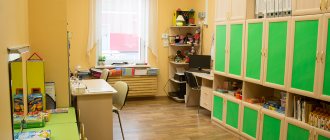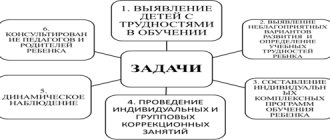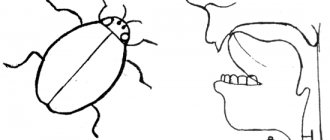Subject, tasks, principles and methods of speech pedagogy
Topic: Preschool speech pedagogy as a science
| Item | Development and formation of a child’s speech with various deviations from normal ontogenesis in the conditions of a targeted pedagogical process. The structure of the pedagogical process includes: subject, object, content, speech therapy diagnostics, criteria for the effectiveness of speech therapy intervention. |
| Subject | Children with speech impairments caused by immaturity, underdevelopment or damage at an early stage of ontogenesis of speech, psychological or physiological mechanisms, in the presence of normal hearing, vision and intact intelligence. |
| Tasks | 1. Study of the patterns of special education and upbringing of children with speech disorders. 2. Development of methods for early pedagogical diagnosis of speech disorders, pedagogical typology of speech underdevelopment in preschool age. 3. Determination of the principles, content and methods of correctional teaching of language and speech. 4. Development of programs, creation of teaching aids, methodological systems of classes and exercises, drawing up recommendations for preschool educational institutions and parents. |
| Principles | 1. The principle of development (reliance on the zone of proximal development, leading activity, the sequence of appearance of the forms and functions of speech). 2. The principle of a systems approach (speech is a complex functional system, the structural components of which are in close interaction, therefore the corrective effect should be exerted on all aspects of the speech system). 3. The connection of speech with other aspects of mental development (speech activity is formed and functions in close connection with the entire psyche of the child as a whole). 4. The principle of complexity (elimination of speech disorders should be of a medical, psychological and pedagogical nature). 5. The principle of a workaround (the formation of a new functional system occurs by bypassing the affected link). 6. Didactic principles (visuality, accessibility, awareness, individual approach, etc.) |
| Methods | 1.Organizational (comparative, longitudinal, complex). 2. Empirical (psychodiagnostic, biographical, observation, experiment, etc.). 3. Quantitative and qualitative analysis of the results. 4. Interpretive. |
| Basic Concepts | Speech disorders, speech disorders, speech defects, speech deficiencies, speech underdevelopment, speech pathology, speech deviations. |
| Relationship with other branches of science | Speech pedagogy is the didactic aspect of speech therapy, which is part of special (correctional) preschool pedagogy and is associated with medical-biological, linguistic branches of science, various sections of special pedagogy and psychology, and private methods. |
Speech pedagogy is based on the following principles:
— mastery of language forms, speech, and learning skills occurs in activities during which the need for communication arises and develops;
- social environment and communication are factors that determine the intensity of speech development;
— the need to teach children special techniques for organizing speech
communication to implement a communicative approach to speech development;
— development and correction of speech are means of mental education.
Speech pedagogy (LP) as a branch of correctional pedagogy.
Speech pedagogy is the theory and practice of teaching and raising children with speech disorders. Currently, there is a dynamic development of the object and subject of study of speech pedagogy. The expansion of the facility takes place due to an increase in the age range covered by the contingent. The lower limit is the first months of life, the upper limit is the whole life. The continuity of the learning process and its extension beyond school age with the inclusion of special events in preschool and even early childhood is a requirement of the time. The expansion of the subject is determined by changes in living conditions, as well as an increase in the number of means used in correction at the present time in comparison with training and education in boarding schools. Until recently, children with SLD were raised mainly in closed residential institutions. Now they are predominantly educated in integrated classes, in public schools in their communities. That. The object of study of speech pedagogy as an independently developing science will be speech disorders. The subject is the types, means and methods of corrective action on the existing violation. The subject is a person with SND.
The following goals are identified: 1. Realization of the rights of persons with special needs to receive special education and correctional assistance by ensuring their accessibility and creating special conditions for this; 2. Social adaptation and integration of these persons into society, including the acquisition of self-service skills, preparation for work and professional activities and for family life.
Tasks at the present stage of LP:
· Development of concepts about the essence of speech development disorders, ways of its compensation and correction;
· Rationale and creation of a system of special organization of psychological assistance;
· Scientific and methodological support for the operation of the system of educational institutions (updating the content of education);
· Development of educational routes, methods of pedagogical study of children and establishment of optimal conditions for their development;
· Development of technologies, a set of methods, techniques, means of correctional and pedagogical influence on the individual;
· Providing psychological support in integrated learning conditions;
· Development of forms and methods for studying the generalization and implementation of advanced pedagogical experience into practice.
LP as one of the ped branches. science is closely connected with the entire block of psychologists. sciences and social disciplines. Correction is an integral part of a unified pedagogical process, relying on it and has the closest relationship with general pedagogy, which determines the goals, objectives, content, forms and methods of teaching and educating the versatile development of the individual. At the same time, the LP makes significant amendments to the methodology and technology of applying pedagogical knowledge, the content of training and education in accordance with the nature and nature of the defect, and also develops its own techniques and methods of corrective influence. Without knowledge of the basics of general psychology, it is difficult to organize effective correctional work, especially since the results of the study and the patterns of child development show that they are identical for both normal and pathological conditions. At the same time, children with developmental disabilities are characterized by mental traits that cannot always be found in normal people. Also, the dialectical unity of the general and the special, the ordinary and the unusual in the mental state leads to a statement of the relationship between LP and philosophy. Painstaking correctional work, everyday pedagogical influence on the defect leads to the manifestation of the philosophical pattern of the transition from quantity to quality.
LP is closely related to special psychology, or more precisely to logopsychology - an area of psychological science that studies people who are characterized by deviations from the norm of mental development associated with HP. Understanding the essence of language, its functions, structure and path of development is important for LP. Therefore, LP is associated with psycholinguistics and linguistics. The LP traces a connection with social pedagogy, the subject of which is the study of the educational forces of society, the state and private organizations in order to create conditions for the development and positive self-realization of a person. There is a connection with social psychology in that it studies the patterns of behavior and activity of people determined by the fact of their inclusion in social groups. Sociology helps in studying the patterns of formation of the functioning and development of society as a whole, social relations and social communities.
It can be noted that correctional pedagogical activity will be more effective when it is based on knowledge in the field of child psychiatry, neuropathology and other medical sciences. With honey t.zr. The basis for correctional pedagogy is pediatrics, which studies the health of the child, the processes of its development, physiology, pathology, methods of prevention and treatment of diseases. The source of many developmental deviations is the state of the nervous system, so the teacher needs to have knowledge of neurological data, i.e. science about the structure and functions of the human nervous system. And in order to correlate the norm and pathology of the NS condition, a relationship with neuropathology is required, i.e. a field of medicine that studies diseases of the nervous system and its role in the pathology of other organs and systems. When correcting mental dysfunction, one cannot do without systematic psychological influences on a person, i.e. without psychotherapy, which acts as a complex of psychological influences on the patient, aimed at increasing his strength in the fight against the disease, at creating a protective restorative regime that excludes psychological trauma.
Conceptual-categorical apparatus
Special education is the process of training and education of persons with special needs, including special conditions for obtaining appropriate education, provision of correctional assistance, social adaptation and integration into society.
A person with special needs is a person who has a physical and (or) mental disorder that prevents them from receiving education without creating special conditions for this.
A child with OPFR is a person with OPFR under the age of 18 years.
Physical and (or) mental disorder is a deviation from the norm that limits social activity and is confirmed by law.
Multiple physical and (or) mental disorders - 2 or more physical and (or) mental disorders established by law.
Severe physical and (or) mental impairment is a disorder expressed to such an extent that obtaining education in accordance with the educational standard (including special ones) is inaccessible and learning opportunities limit the acquisition of basic knowledge about the world around us, the acquisition of self-service skills, and basic labor skills and vocational training.
Early comprehensive assistance is a system of measures that includes identification, examination, correction of physical and mental disorders, individual education of a child with special needs developmental disabilities under the age of 3 years with psychological and pedagogical support in a family setting, educational institution and health care organization.
Correction is a system of psychological, pedagogical and medical-social measures aimed at correcting or weakening physical and mental disorders.
Psychological, medical and pedagogical examination is the study, using special methods and techniques, of the individual characteristics of a child’s personality, the development of his cognitive and emotional spheres, potential capabilities and health status in order to determine special conditions for receiving education.
Special conditions for obtaining education are the conditions of training and education without which it is not possible or difficult for persons with special needs to master the relevant educational programs.
Special educational institutions are educational institutions created for the training and education of persons with special needs.
Integrated training and education is the organization of special education, in which the training and education of persons with special needs is carried out in the conditions of a general educational institution, the creation of special conditions for the stay and education of such persons.
Education at home is the organization of special education, in which the assimilation of relevant educational programs for persons with special needs for health reasons who are temporarily or permanently not attending educational institutions is carried out at home.
Compensation – compensation, equalization, development of impaired or underdeveloped functions, restructuring of intact functions to replace impaired ones; acquisition in training and education of methods of activity and behavior that promote social adaptation and integration.
Habilitation is the formation and development of the functional system of the body and the abilities of the individual, the natural formation of which is hampered by existing physical developmental disorders; application to young children with developmental disabilities, because in relation to early age, we may not be talking about the return of abilities to something, but about its primary formation.
Socialization is the process of an individual’s entry into the social environment, his mastery of practical and theoretical skills, and the transformation of real-life deviations into personality traits.
Adaptation - in a broad sense - is the process of adapting the structure and functions of the body to changed living conditions.
Speech pedagogy, General issues of the theory of speech pedagogy briefly
Hello, you will learn about speech pedagogy. Let’s look at its main types and features of use. There will be many more detailed examples and descriptions. In order to better understand what speech pedagogy is, I strongly recommend reading everything from the category Correctional pedagogy and speech pedagogy
Speech pedagogy is a branch of correctional pedagogy that develops the theoretical and methodological foundations for teaching and raising children with speech disorders. The subject of speech pedagogy is methods and techniques for teaching and educating people with speech disorders. Tasks of speech pedagogy. 1. Development of scientifically based principles and methods of training and education of persons with speech disorders, as well as the prevention of speech disorders. 2. Study of speech development in accordance with age norms. 3. Determination of the etiology, symptoms, degree of manifestation and structure of the speech defect. 4. Development of methods for psychological and pedagogical diagnosis of speech disorders. 5. Development of principles for organizing speech therapy assistance. 6. Systematization of speech disorders. 7. Early detection and elimination of speech disorders in children. The central problem of speech pedagogy is the search for ways to resolve the contradictions between the need for adults to convey social and cultural experience to a child with SLI and the child’s real capabilities, since traditional ways of solving educational and upbringing problems are insufficient. Current problems of speech pedagogy - development of technologies for interaction between specialists of various profiles involved in the educational process, development of content and methods of interaction with families raising a child with speech and language disorders, determination of the role and function of computer technologies in solving the central problems of special education, development of methods and technologies for high-quality individualization of special education , improving integrated learning and developing new forms of interaction between mass and special education. Speech pedagogy is closely related to other sciences. The website https://intellect.icu talks about this. There are intrasystem and intersystem connections. Intrasystemic ones include connections between speech pedagogy and pedagogy, with various branches of special pedagogy, with general and special psychology. Intersystem connections include connections with medical, biological and linguistic sciences. The subject is the development and formation of a child’s speech with various deviations from normal ontogenesis in the conditions of a targeted pedagogical process. The structure of the pedagogical process includes: subject, object, content, speech therapy diagnostics, criteria for the effectiveness of speech therapy intervention. The subject is children who have speech impairments caused by immaturity, underdevelopment or damage at an early stage of ontogenesis of speech, psychological or physiological mechanisms, in the presence of normal hearing, vision and intact prerequisites for intelligence. tasks
1. study of the patterns of special education and upbringing of children with speech disorders.
2. development of methods for early pedagogical diagnosis of speech disorders, pedagogical typology of speech underdevelopment in preschool age.
3. determination of the principles, content and methods of correctional teaching of language and speech.
4. development of programs, creation of teaching aids, methodological systems of classes and exercises, drawing up recommendations for preschool educational institutions and parents. Principles
1. The principle of development (reliance on the zone of proximal development, leading activity, the sequence of appearance of the forms and functions of speech). 2. The principle of a systems approach (speech is a complex functional system, the structural components of which are in close interaction, therefore the corrective effect should be exerted on all aspects of the speech system).
3. connection of speech with other aspects of mental development (speech activity is formed and functions in close connection with the entire psyche of the child as a whole).
4. The principle of complexity (the elimination of speech disorders should be of a medical-psychological-pedagogical nature).
5. The principle of a workaround (the formation of a new functional system occurs by bypassing the affected link).
6. didactic principles (visuality, accessibility, awareness, individual approach, etc.). Methods
1. organizational (comparative, longitudinal, complex).
2. Empirical (psychodiagnostic, biographical, observation, experiment, etc.).
3. Quantitative and qualitative analysis of the results.
4. interpretive. basic concepts
- speech disorders,
- speech disorders,
- speech defects,
- speech impediments,
- speech underdevelopment,
- speech pathology,
- speech deviations.
relationship with other branches of science Speech pedagogy is the didactic aspect of speech therapy, which is part of special (correctional) preschool pedagogy and is associated with medical-biological, linguistic branches of science, various sections of special pedagogy and psychology, and private methods. The competency-based approach focuses on the development of practical practical activities of students, highlighting general and special skills that are directly required in life and in subsequent professional education. Competence is considered as possession of competence, readiness to demonstrate competencies, possession of skills and methods of activity in relation to a given range of real objects. Key competencies are considered as the most general (universal) abilities and skills that allow a person to achieve results in practical activities and personal life in the conditions of the increasing dynamism of modern society. Social, personal, communicative, cognitive and informational are recognized as key competencies. In the context of the competency-based approach, special correctional education is considered not as a process of forming knowledge, skills and abilities, but as a process of forming key educational competencies. This means that in each specific academic subject, key competencies are searched and identified, and their hierarchy is established. social key competence includes social-everyday (mastering the culture of everyday life), social-labor, general cultural (normative cultural), revealing the mastery of national culture and the formation of the national mentality, the competence of social interaction, self-knowledge and self-control. The latter reflects knowledge of one’s capabilities, needs and the ability to control one’s behavior. Personal key competence includes sanogenic (competence of a healthy lifestyle), value-semantic (understanding of the true values of life and the formation of attitudes towards their implementation), gender-role (mastery of correct gender-role behavior), legal (knowledge and ability to realize one’s rights and fulfill the duties of a citizen of the country) , reflective (the ability to carry out self-analysis and evaluate others). Communicative key competence includes linguistic competence, socio-communicative (mastery of interaction and cooperation skills), socio-cultural (knowledge of the culture of the society to which a person belongs). Cognitive-informational key competence includes the competence of cognitive activity (educational-cognitive competence), computer-information, information-communicative competence.
That's all! Now you know everything about speech therapy. Remember that it will now be easier to use in practice. I hope that now you understand what speech therapy is and why all this is needed, and if you don’t understand, or if you have any comments, then feel free to write or ask in the comments, I will be happy to answer. In order to gain a deeper understanding, I strongly recommend that you study all the information from the category Correctional pedagogy and speech pedagogy
Speech therapy
Speech therapy is the science of speech disorders , methods of their prevention, identification and elimination by means of special training and education. Speech therapy studies the causes, mechanisms, symptoms, course, structure of speech disorders, and the system of correctional interventions.
The term “speech therapy” comes from the Greek roots: logos (word), paideo (educate, teach) - and translated means “education of correct speech.” The subject of speech therapy as a science is speech disorders and the process of training and education of persons with speech disorders. The object of study is a person (individual) suffering from a speech disorder. Speech disorders are studied by physiologists, neuropathologists, psychologists, linguists, etc. Moreover, everyone views them from a certain angle in accordance with the goals, objectives and means of their science. Speech therapy considers speech disorders from the standpoint of prevention and overcoming by means of specially organized training and education, therefore it is classified as special pedagogy.
The structure of modern speech therapy consists of preschool, school speech therapy and speech therapy for adolescents and adults. The main goal of speech therapy is to develop a scientifically based system of training, education and re-education of people with speech disorders, as well as the prevention of speech disorders.
Domestic speech therapy creates the most favorable conditions for the personality development of children with speech disorders. The successes of domestic speech therapy are based on numerous modern studies by domestic and foreign authors, indicating the great compensatory capabilities of the developing children's brain and the improvement of ways and methods of speech therapy correction. I. P. Pavlov, emphasizing the extreme plasticity of the central nervous system and its unlimited compensatory capabilities, wrote: “Nothing remains motionless, inflexible, but can always be achieved, changed for the better, if only the appropriate conditions are met.”
Based on the definition of
speech therapy as a science, the following tasks can be distinguished: 1. Study of the ontogenesis of speech activity in various forms of speech disorders.
2. Determination of the prevalence, symptoms and severity of speech disorders. 3. Identification of the dynamics of spontaneous and directed development of children with speech disorders, as well as the nature of the influence of speech disorders on the formation of their personality, on mental development, on the implementation of various types of behavioral activities. 4. Study of the features of speech formation and speech disorders in children with various developmental disabilities (with impairments of intelligence, hearing, vision and the musculoskeletal system). 5. Clarification of the etiology, mechanisms, structure and symptoms of speech disorders. 6. Development of methods for pedagogical diagnosis of speech disorders. 7. Systematization of speech disorders. 8. Development of principles, differentiated methods and means of eliminating speech disorders. 9. Improving methods for preventing speech disorders. 10. Development of issues related to the organization of speech therapy assistance. In the indicated tasks of speech therapy , both its theoretical and practical orientation are determined. Its theoretical aspect is the study of speech disorders and the development of scientifically based methods for their prevention, identification and overcoming. The practical aspect is the prevention, identification and elimination of speech disorders. The theoretical and practical tasks of speech therapy are closely related. To solve the tasks it is necessary:
— the use of interdisciplinary connections and the involvement of many specialists who study speech and its disorders (psychologists, neuropsychologists, neurophysiologists, linguists, teachers, doctors of various specialties, etc.); — ensuring the relationship between theory and practice, connecting scientific and practical institutions for faster implementation of the latest scientific achievements into practice; — implementation of the principle of early detection and overcoming speech disorders; — dissemination of speech therapy knowledge among the population for the prevention of speech disorders. The solution to these problems determines the course of speech therapy intervention.
The main focus of speech therapy is speech development, correction and prevention of speech disorders. In the process of speech therapy work, the development of sensory functions is provided; development of motor skills, especially speech motor skills; development of cognitive activity, primarily thinking, memory processes, attention; formation of the child’s personality with simultaneous regulation and correction of social relationships; impact on the social environment.
The organization of the speech therapy process makes it possible to eliminate or mitigate both speech and psychological disorders, contributing to the achievement of the main goal of pedagogical influence - the education of a person.
Speech therapy intervention should be aimed at both external and internal factors causing speech disorders . It is a complex pedagogical process aimed primarily at the correction and compensation of speech impairments.
Do you need a speech therapist in Moscow? Sign up for a consultation by phone or through the feedback form in the “Contacts” section.








